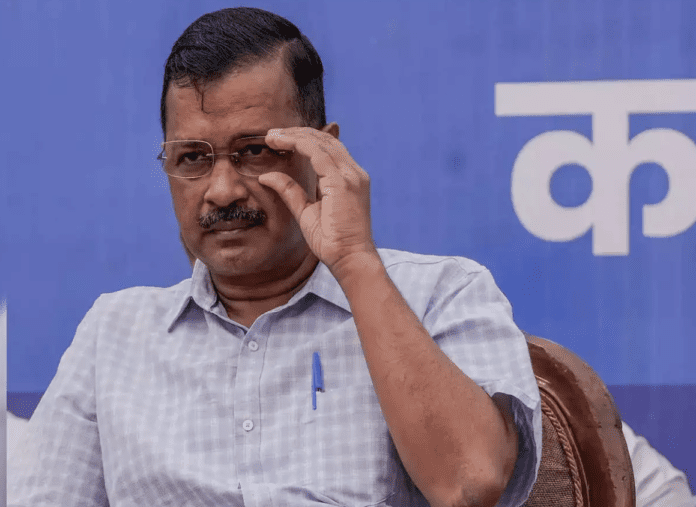Delhi Chief Minister Arvind Kejriwal arrested by ED in a money laundering case linked to excise policy. Presented in Delhi’s Rouse Avenue court, ED seeks 10-day custody.
2 min read 2024-03-22, 04:20 PM IST
In Short∼ Delhi Chief Minister Arvind Kejriwal arrested by Enforcement Directorate (ED) after Delhi High Court refuses relief in excise policy case. ∼ Kejriwal faced nine summonses from probe agency prior to arrest. ∼ AAP leaders and supporters protest, alleging political vendetta by BJP. ∼ Arrest seen as attempt to hinder Kejriwal’s political activities during crucial elections. ∼ Opposition accuses BJP of using investigative agencies for political gains. ∼ AAP portrays arrest as persecution, seeks to mobilize support against BJP. ∼ Media narratives vary, with some outlets framing arrest as victory for justice, while others highlight political victimization. ∼ International community expresses concern over erosion of democratic norms in India. ∼ Case raises questions about rule of law, independence of institutions, and democratic values. ∼ Judiciary’s role crucial in upholding constitutional principles and restoring public trust. ∼ Kejriwal’s arrest serves as test for India’s commitment to democracy and pluralism. ∼ Outcome of case will have significant implications for India’s democratic trajectory and international standing. |
Delhi CM Arvind Kejriwal
As the saga of Arvind Kejriwal’s arrest unfolds, it becomes a focal point for broader discussions around the intersection of politics, law enforcement, and democracy in India. Beyond the immediate implications for Kejriwal and the AAP, this incident raises questions about the nature of political rivalry, the role of investigative agencies, and the health of democratic institutions.
At the heart of this controversy lies the issue of political vendetta. Kejriwal’s supporters vehemently argue that his arrest is not merely a legal matter but a calculated move by the ruling BJP to cripple the opposition. They point to the timing of the arrest, coinciding with crucial elections, and allege that it is designed to tarnish Kejriwal’s image and hinder his political activities.
The BJP, on the other hand, maintains that the arrest is a result of due process and accuses Kejriwal of evading accountability. They argue that no one is above the law and that investigative agencies must be allowed to carry out their duties independently, without political interference. However, critics question the selective targeting of opposition leaders and point to instances where BJP members facing similar allegations have not faced similar scrutiny.
ALSO READ: Delhi’s Chief Minister Press Conference.
The use of investigative agencies as tools of political retribution is not unique to India. Across the world, governments have been accused of weaponizing law enforcement agencies to silence dissent and consolidate power. In India, the phenomenon is particularly pronounced given the highly polarized political landscape and the centralization of power in the hands of a few dominant parties.
The AAP’s response to Kejriwal’s arrest reflects the party’s broader strategy of positioning itself as a champion of clean governance and anti-corruption. Since its inception, the AAP has presented itself as an alternative to traditional political parties tainted by corruption and cronyism. Kejriwal’s personal brand, as a crusader against corruption, has been central to the party’s appeal, particularly among urban middle-class voters disillusioned with mainstream politics.
By portraying Kejriwal as a victim of political persecution, the AAP seeks to galvanize its support base and rally public opinion against the BJP. The party’s ability to mobilize mass protests and generate media attention underscores its organizational strength and its adeptness at leveraging social and traditional media platforms.
However, Kejriwal’s arrest also exposes fault lines within the opposition camp. While some leaders express solidarity with Kejriwal, others maintain a conspicuous silence or distance themselves from the controversy. This reflects the fragmented nature of Indian opposition politics, characterized by competing interests and egos, which often undermine collective action against the ruling party.
The role of the media in shaping public perception of Kejriwal’s arrest cannot be overstated. Mainstream media outlets, particularly those sympathetic to the BJP, frame the arrest as a victory for justice and highlight allegations of corruption against Kejriwal and his administration. Conversely, independent media and social media platforms amplify the AAP’s narrative of political victimization and cast doubt on the integrity of investigative agencies.
In this age of information proliferation, the battle for narrative control is as crucial as the legal battle itself. Both the AAP and the BJP deploy sophisticated communication strategies to shape public opinion and mobilize support. This includes leveraging social media influencers, organizing digital campaigns, and disseminating propaganda through various channels.
The international community’s response to Kejriwal’s arrest is also noteworthy. Human rights organizations and foreign governments express concern over the erosion of democratic norms and the politicization of law enforcement in India. Calls for due process, respect for civil liberties, and impartiality in legal proceedings underscore the global relevance of Kejriwal’s case.
At its core, Kejriwal’s arrest raises fundamental questions about the rule of law and the independence of institutions in India. The judiciary’s role in upholding constitutional principles and ensuring accountability is paramount. As the legal proceedings unfold, the judiciary must demonstrate impartiality, transparency, and adherence to due process to restore public trust in the justice system.
Moreover, Kejriwal’s arrest serves as a litmus test for India’s commitment to democratic values and pluralism. The ability of political leaders to dissent, criticize the government, and mobilize public opinion is essential for a vibrant democracy. Any attempt to stifle dissent or suppress opposition undermines the democratic fabric of the country and sets a dangerous precedent for the future.
The arrest of Arvind Kejriwal is not just a legal issue but a symbol of broader political dynamics in India. It underscores the intense competition for power, the weaponization of law enforcement agencies, and the resilience of democratic institutions. How India navigates this crisis will have far-reaching implications for its democratic trajectory and international standing. As the world watches, the fate of Kejriwal and the AAP will be a barometer of India’s commitment to democracy, justice, and the rule of law.

